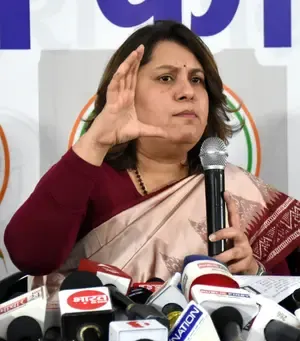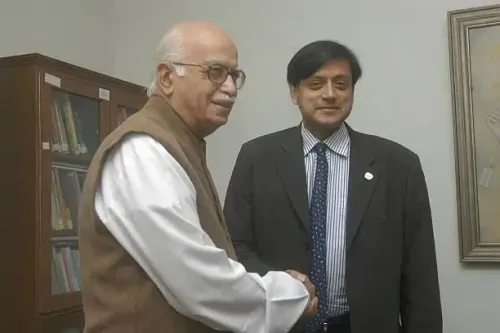Does India's Global Engagement Need a Rethink?

Synopsis
Key Takeaways
- Need for reassessment of India's diplomatic strategies.
- Importance of transparency in foreign policy.
- Concerns over the evolving global perception of Pakistan.
- Effectiveness of international outreach questioned.
- Disconnect between domestic accountability and international engagement.
New Delhi, June 6 (NationPress) Congress leader Supriya Shrinate, during a press conference on Friday, raised alarms regarding what she termed a decline in India's diplomatic engagement and visibility on the global platform. She underscored India's absence from significant gatherings such as the G7, despite its status as one of the largest economies globally.
Shrinate referenced former US President Barack Obama's commendations of then-Prime Minister Manmohan Singh in 2010 and questioned why nations like Canada now seem reluctant to invite India to the G7. She interpreted this as a symptom of declining diplomatic clout.
Moreover, she mentioned public assertions made by US President Donald Trump, who has claimed to have facilitated a ceasefire between India and Pakistan. The Congress spokesperson noted that such claims are now being reiterated by Russia as well. She urged the Indian government to provide clear responses to these statements, advocating for transparency in international relations. "The nation deserves clarity," she emphasized.
Shrinate also expressed unease about a perceived preference for image-building over meaningful diplomacy. She cautioned against an excessive focus on symbolic acts or visual narratives, suggesting that a more strategic and coherent foreign policy is essential to protect national interests.
She voiced concerns over "the changing global perception" of Pakistan. Institutions like the IMF, ADB, and the World Bank have provided substantial financial aid to Pakistan, which has also taken on roles in international organizations such as the UN’s Counter-Terrorism Committee. In her opinion, this contradicts India’s long-standing anti-terrorism stance and highlights a missed chance for stronger international advocacy.
Commenting on recent international outreach by Indian parliamentary groups, Shrinate questioned the effectiveness of these initiatives. She noted that numerous visits resulted in meetings with lower-ranking officials or Indian diaspora groups rather than key foreign leaders or decision-makers. "We must evaluate the tangible results of these visits," she remarked.
Turning to domestic issues with international ramifications, Shrinate referred to the tragic terror attack in Pahalgam on April 22, which claimed the lives of 26 individuals. She critiqued the timing of the Prime Minister’s visit to Jammu and Kashmir, implying that it was more ceremonial than a response to the tragedy. She expressed disappointment that "national security issues in sensitive areas are not consistently met with prompt or visible action."
Shrinate also commented on perceived shifts in India's traditional alliances, particularly concerning Russia’s recent collaboration with Pakistan. She cautioned that regional dynamics are evolving, with China and Pakistan strengthening ties—a situation that opposition leaders have long warned against.
When queried about Congress MPs, including Shashi Tharoor, who participated in foreign delegations and later described the visits as positive, Shrinate recognized the complexities of international diplomacy. She noted that while representatives may exercise restraint abroad, there remains an obligation to pose tough questions domestically. She referenced Kuwait's recent decision to lift a 19-year visa ban on Pakistan shortly after an Indian delegation's visit, suggesting this raised valid questions regarding diplomatic efficacy.
A significant concern she highlighted was the apparent reluctance to engage in comprehensive discussions within Parliament about foreign policy matters while simultaneously prioritizing engagement with Indian communities abroad. "There seems to be a disconnect between domestic accountability and international outreach," she stated.
The Congress spokesperson underscored the necessity for a more grounded and outcome-oriented foreign policy approach. In her view, the current trajectory risks marginalizing India’s voice in global dialogues, despite its increasing economic prominence.








